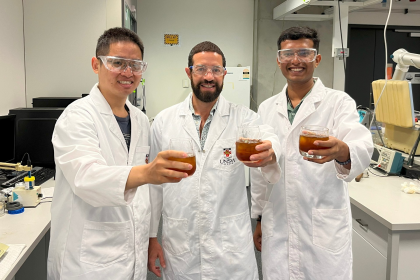Admin
AI poised to usher in new level of concierge services to the public
Researchers explore how intelligent systems can upgrade hospitality sector Concierge services built on artificial intelligence have the potential to improve…
Gene therapy relieves back pain, repairs damaged disc in mice
Study suggests nanocarriers loaded with DNA could replace opioids Disc-related back pain may one day meet its therapeutic match: gene…
How the ‘home’ environment influences microbial interactions
Study shows low-nutrient conditions alter viral infection of cells This much we know: When viruses infect bacteria – a common…
Hear that? That’s the sound of an ultrasonic cold brew coffee ready in under three minutes
The UNSW team who developed the three-minute cold brew - Shih-Hao Chiu, Dr Francisco Trujillo and Nikunj Naliyadhara. credit: UNSW/Cecilia…
New psychological therapy shows promise in improving quality of life for people living with MND
The largest-ever trial of a psychological intervention for patients with the debilitating neurological condition, conducted by researchers at the University…
Aligned peptide ‘noodles’ could enable lab-grown biological tissues
A team of chemists and bioengineers at Rice University and the University of Houston have achieved a significant milestone in…
AFTER 25 YEARS, RESEARCHERS UNCOVER GENETIC CAUSE OF RARE NEUROLOGICAL DISEASE
Some families call it a trial of faith. Others just call it a curse. The progressive neurological disease known as…
Bacteria ‘nanowires’ could help scientists develop green electronics
Engineered protein filaments originally produced by bacteria have been modified by scientists to conduct electricity. In a study published recently…



